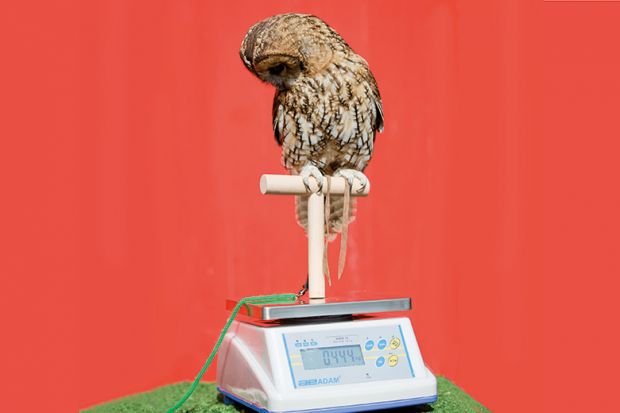Measure for measure for measure
“You should have seen his face. He was once again in his element.”
That was how a close colleague described Jo Johnson’s demeanour after the minister for universities and science had finished addressing the Higher Education Funding Council for England last Thursday.
And what, asked our reporter Keith Ponting (30), had brought about this change of mood?
“It’s simple, really,” explained the colleague, who stressed that he was speaking “off the record”. “Mr Johnson is a measuring man. Frankly, he’s never happier than when he has a metric in his hand. But until recently, he had only two ways of measuring university performance. There was the good old research excellence framework, which cost a great deal of time and money and distorted research priorities, and there was his own brand-new metric, the teaching excellence framework, which cost a great deal of time and money and had no correlation whatsoever with any other measure of teaching quality.”
And that was not enough?
“Oh no. Think about it. Two relatively unreliable and relatively invalid metrics are never going to be enough for a fully fledged measuring man.”
But what else was there left to measure?
“That was the tricky part. At one time, there was talk within the Department for Education of introducing a measurement excellence framework, the MEF, which would have measured how good academics were at completing measurements. But that foundered for practical reasons.”
It would have meant asking academics to measure their own reluctance to engage in any more measurement?
“Exactly.”
And so?
“It was very much back to the drawing board. And that was when our measuring man had his bright idea. For years, he’d been insisting that one of the primary purposes of universities was to promote business and contribute to the national economy. So why not have a metric that actually measured the extent of their business collaboration? And so it was that last Thursday he proudly unveiled the knowledge exchange framework, the KEF.”
Would there be gold and silver and bronze awards in the new KEF?
“It appears that universities will have their degree of business collaboration recognised with the award of chimney stacks. But, as you’ll appreciate, at this stage the details are rather less important than the discovery of a brand-new metric.”
Footnote: Our university is already hard at work recruiting the managerial team that will be responsible for providing academics with the bureaucratic means for assembling this brand-new metric. Our current Head of TEF Submissions, Mr Ted Chippings, described the KEF as “truly exciting”. “Some of us here in administration were already concerned that there were still one or two aspects of academic life that were not fully under government control.”
Academic reaction has so far been muted, although, as we go to press, we learn that Mr Odgers of our Department of Media and Cultural Studies has emailed “All” to suggest that the only way ahead for any academic who now faces a future dominated by REFing and TEFing and KEFing was to give serious consideration to the idea of early retirement, or what he colloquially described as “EFFing Off”.
